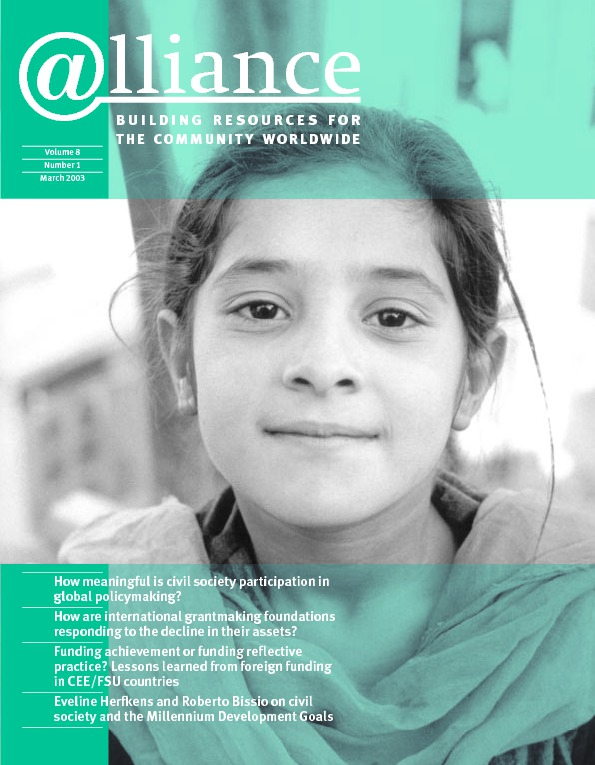‘The Pakistan Centre for Philanthropy (PCP) should engage with the new government to continue the Enabling Environment Initiative (EEI) momentum,’ says Dr Attiya Inayatullah, a newly elected member of Pakistan’s national assembly.[1] ‘All governments know that they cannot deliver on their own. They need to partner with civil society.’
Dr Inayatullah should know. As Federal Minister for Social Welfare in the former government, she led the EEI. Recognizing the role and value of the non-profit sector, the federal cabinet endorsed the EEI in August 2001. The aim was to reform the regulatory and fiscal regime governing civil society – but only after extensive consultation with all stakeholders. The government had learnt lessons from the past and was anxious to avoid the acrimony generated by the failed reform efforts of the 1990s. A month later, PCP was commissioned to implement the new initiative. For PCP, this is part of its long-term goal of creating a credible and effective non-profit sector that is financed largely by indigenous philanthropy.
From November 2001 to August 2002, the PCP-EEI team consulted over 2,000 people – policymakers, government officials, CSO activists, CSO coalitions and networks, philanthropists, eminent citizens – in more than 65 meetings across the country.
Recommendations for reform
In August, 2002, the EEI presented two main recommendations to government. The first was that a new law should be passed to replace the two main non-profit laws,[2] and that statutory, autonomous bodies[3] be created at federal and provincial levels to implement the new law. These regulatory bodies would create capacities across government departments to facilitate effective partnerships with CSOs. Overall, the set of recommendations for legal, fiscal and institutional reform aims to introduce a more positive relationship between CSOs and the government; to support CSOs in undertaking public benefit activities; to remove wasteful duplication; and to reduce government discretion in relation to registration, monitoring and evaluation.[4]
Second, it was proposed that a comprehensive national policy on the non-profit sector be developed through a stakeholder policy dialogue. This would consolidate and ground legislative reforms in a consultation process and lead to a ‘national compact’ for citizen participation for the public benefit. Given the conflicting signals from various levels of government and the history of mistrust between government and civil society, especially rights advocacy organizations, this effort to build a wide consensus around the role of civil society is critical for the sustainability of legislative reforms.
Government has already accepted EEI’s fiscal reform recommendations through the Finance Ordinance 2002. The menu of eligible purposes and range of fiscal benefits has been expanded. Most important, the new rules incorporate the concept of evaluation of NPOs by an independent certification agency for purposes of obtaining tax exemption.
What next?
In the waning days of the military government, a modified version of the draft law that excluded the proposed autonomous regulatory body and did not extend the new law to the Societies Registration Act was accepted. This version also received the general endorsement of the CSO representative coalitions. The modified law[5] was awaiting cabinet decision when elections ushered in a new government in October 2002.
What are the chances of the new government accepting the EEI recommendations? They appear mixed. On the one hand, elected governments in Pakistan have mostly not enjoyed harmonious relationships with civil society, especially during the 1990s. Muttahida Majlis-i-Amal (MMA), a coalition of Islamist parties that has emerged as a major political force in the elections, may also be opposed to reforms that can be seen as increasing the protection of foreign-funded rights-based advocacy organizations.
On the other hand, the thrust of reforms launched by the military government is likely to continue. Decentralization, deregulation and privatization appear to be irreversible trends, for which there is broad support among competing political parties. There is continuity of leadership too. Many leading lights in the previous government occupy senior positions in the new one. Fears regarding MMA could be partly unfounded.
While planning to engage with government, PCP is simultaneously preparing to introduce an independent NPO certification regime, as envisaged in the Income Tax Rules 2002. This will reduce discretion and facilitate access to fiscal benefits for NPOs. Certified NPOs will be listed in PCP’s directory of credible NPOs for corporate and diaspora donors.
1 She is also a member of the PCP Board and a renowned CSO leader.
2 Of the total 45,000 NPOs, 38 per cent are not registered; of the 62 per cent that are registered, some 90 per cent are registered and regulated by the Voluntary Social Welfare Agencies (Registration and Control) Ordinance 1961 and the Societies Registration Act 1860.
3 These bodies will consist mainly of NPO representatives, plus some eminent citizens and a few government officials.
4 ‘Policing and discretionary functions’ such as unannounced physical inspection of NPO offices and books by government officials would not be allowed. Government would instead rely on arms-length monitoring through scrutiny of submitted documents.
5 Nonprofit Organizations (Governance and Support) Ordinance 2002.
Shahnaz Wazir Ali is Executive Director of PCP. She is an educationist by profession; she has also been actively involved in the women’s rights movement in Pakistan and in civil causes, and is recognized as a leading social sector professional. She can be contacted at shahnazwa@pcp.org.pk
Visit the PCP website at http://www.pcp.org.pk to read or download the EEI report Creating an Enabling Legal Framework for Nonprofit Organizations in Pakistan. Chapter 8 contains a review of the international experience of regulatory and assurance frameworks for citizen organizations.





Comments (0)